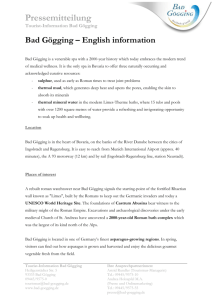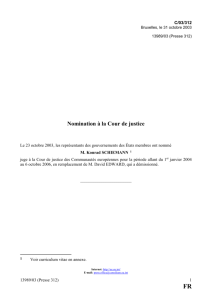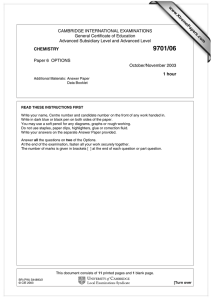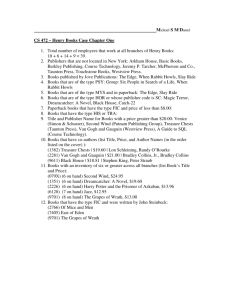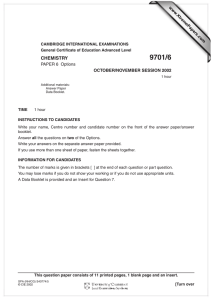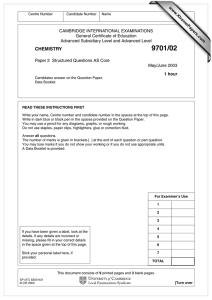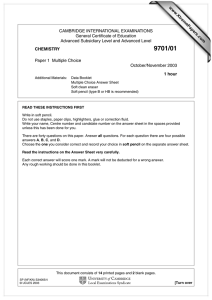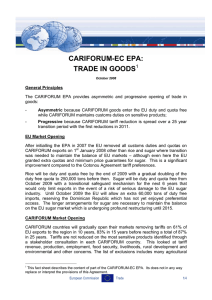Outline for a Joint Caribbean
advertisement
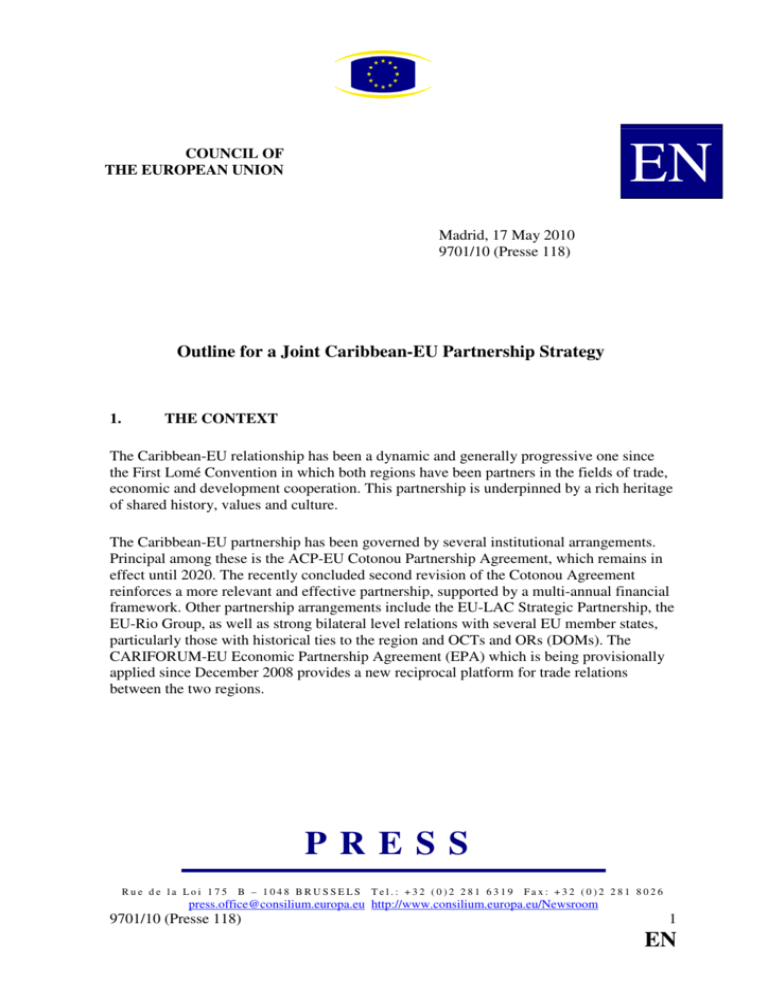
EN COUNCIL OF THE EUROPEAN UNION Madrid, 17 May 2010 9701/10 (Presse 118) Outline for a Joint Caribbean-EU Partnership Strategy 1. THE CONTEXT The Caribbean-EU relationship has been a dynamic and generally progressive one since the First Lomé Convention in which both regions have been partners in the fields of trade, economic and development cooperation. This partnership is underpinned by a rich heritage of shared history, values and culture. The Caribbean-EU partnership has been governed by several institutional arrangements. Principal among these is the ACP-EU Cotonou Partnership Agreement, which remains in effect until 2020. The recently concluded second revision of the Cotonou Agreement reinforces a more relevant and effective partnership, supported by a multi-annual financial framework. Other partnership arrangements include the EU-LAC Strategic Partnership, the EU-Rio Group, as well as strong bilateral level relations with several EU member states, particularly those with historical ties to the region and OCTs and ORs (DOMs). The CARIFORUM-EU Economic Partnership Agreement (EPA) which is being provisionally applied since December 2008 provides a new reciprocal platform for trade relations between the two regions. PRESS Rue de la Loi 175 B – 1048 BRUSSELS Tel.: +32 (0)2 281 6319 Fax: +32 (0)2 281 8026 press.office@consilium.europa.eu http://www.consilium.europa.eu/Newsroom 9701/10 (Presse 118) 1 EN Over time, however, other new and impending developments and challenges – national, sub-regional, regional, hemispheric and global - have also impacted on the partnership. The newly adopted Lisbon Treaty has amended the way in which the EU and its institutions will interact with third countries and regions. This new context provides the opportunity to develop a joint strategy that will foster an enhanced bi-regional relationship to better respond to global challenges and to articulate common interests. The guiding principles for the elaboration of the strategy, which will have a long-term approach, will be characterized by joint ownership, mutual accountability and solidarity, co-management and co-responsibility. The strategy will reflect our common belief in, conviction and respect for the principles enshrined in the UN Charter and in international law. This shared vision, common interests and strategic objectives will mark the beginning of a new phase in the Caribbean-EU relationship. 2. THE COMMON VISION/PURPOSE The establishment of a structured framework for a broader and deeper political dialogue will be one important aspect of the process towards the formulation and implementation of an enhanced political partnership strategy. In view of the ambitions of the enhanced partnership, the various dialogue levels must be adequately flexible to allow partners to consult whether formally or informally and to address issues of common interest and mutual concern to the Caribbean and the EU, whenever these arise. An enhanced partnership also calls for a broadened and intensified dialogue encompassing a larger number of actors, including experts, senior officials, parliamentarians, Ministers and Heads of State and Government, meeting at the highest political level, as well as nonstate actors, regional organizations and other stakeholders, where appropriate, in order to ensure ownership and awareness of the bi-regional strategy. This enhanced partnership should strive to bridge the development divide between the Caribbean and the EU through the promotion of human and economic development, sustainable economic diversification, poverty eradication and regional integration.. Furthermore, the strategy should better synchronise the common priorities and objectives and determine appropriate instruments for their attainment. 9701/10 (Presse 118) 2 EN In that context, a joint Caribbean-EU Strategy should have some key features, including: i. clear and mutually owned goals and objectives, which are in pursuance of the overall objectives of the partnership; ii. fundamental international guiding principles drawn from the UN Charter; iii. an effective implementation and monitoring mechanism based on co- management and mutual accountability, which builds on existing structures, while seeking to avoid excessive bureaucracy; iv. complementarity and coherence among the various partnership frameworks: ACPEU, EU-LAC, Rio Group, Bilateral and Multilateral Relations. 3. SHARED PRIORITIES The CARIFORUM and the EU will identify shared priorities and challenges to be addressed in the context of the joint strategy. These priorities could include: a) Regional Integration and Cooperation in the wider Caribbean, with particular attention to: • Promotion of Sustainable Development, through the building of capacity in the implementation of the EPA; development of enterprise; promoting innovation and competition; increasing investments and exports including in the areas of agro-industry and tourism; development of infrastructure networks and a skilled mobile labour force; generating wealth, social cohesion and poverty alleviation; • Promotion of Human and Social Development, through education and training; food and energy security; health and wellness; youth, gender and culture. b) Reconstruction and Institutional Support to Haiti, through a long term and sustainable programme of cooperation between the CARIFORUM and the EU, taking account of the development goals and strategy defined by Haiti. c) Climate Change and Natural Disasters, with special reference to capacity building, adaptation, mitigation and post disaster reconstruction. 9701/10 (Presse 118) 3 EN d) Crime and Security, including the trafficking of illegal drugs and arms e) Joint Action in Bi-regional, Multilateral and Global fora, including: • Promotion of human rights, democratic values and governance • reform of the United Nations and the international financial system and institutions • coordinated response to the global financial and economic crisis • attainment of the Millennium Development Goals • pursuit of the Doha Development Agenda 4. THE WAY FORWARD Following the Barbados Seminar and the Political Dialogue held in Kingston in March 2010, the approval of the present outline at the CARIFORUM-EU Summit in Madrid paves the way for the formulation, adoption and implementation of the Joint Strategy. It is proposed that the CARIFORUM and the EU establish a Technical Working Group based in Brussels, but with appropriate linkages with existing regional structures, endowed with adequate resources, to develop an enhanced Joint Caribbean-EU Partnership Strategy taking account of the context, the common vision and shared priorities set out in this Outline Document. Furthermore, the appropriate consultation process and calendar should be established, including the definition of the target date for submission and adoption of the final document in the framework of the newly structured political dialogue. 9701/10 (Presse 118) 4 EN
